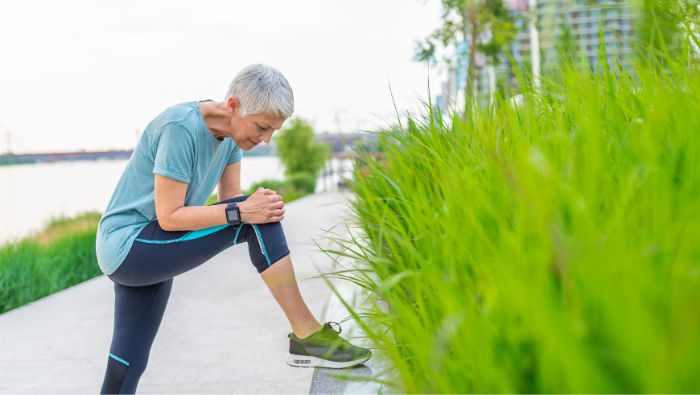Remedies and Strategies for Protecting Your Aging Knees
by Andrea Norris-McKnight

By the time you reach your 50s, chances are, your knees have already carried you many, many miles. And at some point, you start to feel it.
Protecting your knees as you age is crucial for maintaining mobility and preventing pain or injury. According to Lifespan.org, the average age for those needing knee replacement surgery is 66. That age appears to be trending downward.
You might not be able to avoid knee replacement surgery, but you can possibly postpone the need. Here are some strategies to protect your knees and keep them healthier as you age.
How To Protect Aging Knees
The following tips can benefit your knees and overall health.
Maintain a Healthy Weight
Carrying excess weight puts additional strain on your knees, especially for those with osteoarthritis. According to WebMD, “Drop 10 pounds and you’ll take 40 pounds of pressure off” of your knees. If you’re carrying some extra weight, experts recommend losing 10% to alleviate knee pain.
Exercise Regularly
Engaging in regular physical activity strengthens the muscles around the knee joint, providing better support and stability. Focus on low-impact activities such as swimming, cycling, or walking, and include strength training, flexibility and balance exercises.
If you’re 65 or older, consider a Silver Sneakers membership.
You deserve a comfortable retirement.
Warm-Up and Stretch
Always warm up before exercising to increase blood flow to the muscles and improve flexibility. Stretching after exercise helps to maintain or improve flexibility, reducing the risk of injury.
Strengthen Your Leg Muscles
Some of us overlook the importance of strength training as we age. Strengthening the muscles around your knees, including the quadriceps, hamstrings and calf muscles, can help improve joint stability and prevent injury.
You may want to consult your physician about any limitations you should consider if you are already experiencing chronic knee pain or if it has been a long time since you engaged in a regular fitness routine.
Practice Proper Form
Using the correct form when exercising or performing daily activities helps protect your knees from unnecessary stress. Consult a fitness professional or physical therapist if you’re unsure about proper form.
Mix Up Your Activities
Varying your workouts can help prevent overuse injuries. Include a mix of aerobic, strength and flexibility exercises in your routine.
Choose Supportive Footwear
Your feet can play a part in knee discomfort. Invest in high-quality, well-fitted shoes that provide adequate arch support and cushioning. Replace worn-out shoes regularly to ensure continued support. Find out more about why cheap shoes are a bad buy.
Listen To Your Body
Pay attention to any pain or discomfort you experience during or after exercise. Consult a healthcare professional if the pain persists or worsens.
Stay Hydrated
Proper hydration is essential for joint health. Drink water throughout the day to maintain optimal hydration levels.
Prioritize Recovery
Give your body ample time to rest and recover between workouts. Utilize techniques such as foam rolling, massage or ice and heat therapy to address soreness and inflammation.
Consider Supplements
Some supplements, such as glucosamine and chondroitin, may help support joint health. Always speak with your healthcare provider before taking any new supplements.
Dealing With Occasional Knee Pain
For the occasional ache or pain, the following remedies can help provide relief. Remember to consult a healthcare professional before trying these remedies, especially if your pain is severe, persistent, or accompanied by other symptoms like swelling or instability.
Heat and Cold Therapy
Alternating between hot and cold packs can help alleviate knee pain by reducing inflammation and promoting circulation.
Massage
Gently massaging the affected area can help relax muscles, improve circulation, and reduce pain.
Herbal Remedies
Some people find relief with herbal supplements like turmeric, ginger or willow bark. Talk to your healthcare provider before taking herbal remedies, as they may interact with other medications.
Acupuncture
This traditional Chinese medicine technique may help relieve knee pain by stimulating specific points on the body.
Topical Creams
Over-the-counter creams containing capsaicin, menthol or camphor can temporarily relieve knee pain.
Reviewed September 2024
About the Author
Andrea Norris-McKnight took over as the editor of The Dollar Stretcher and After 50 Finances after working for the previous editor for almost 15 years. She has also written for Money.com, GOBankingRates.com, HavenLife.com and The Sacramento Bee.
Sign me up for a comfortable retirement!
Popular Articles
- Comparing Retirement Housing Options
- How We Retired With Almost No Savings
- How Retirees Can Live on a Tight Budget
- 9 Things You Need to Do Before You Retire
- What You Need to Know About Long Term Care Insurance Before You Retire
- You Didn’t Save Enough for Retirement and You’re 55+
- Could Debt Derail Your Retirement? A Checklist
- Your Emergency Fund In Retirement: A Comprehensive Guide
- Managing Your 401k In Your 50s

